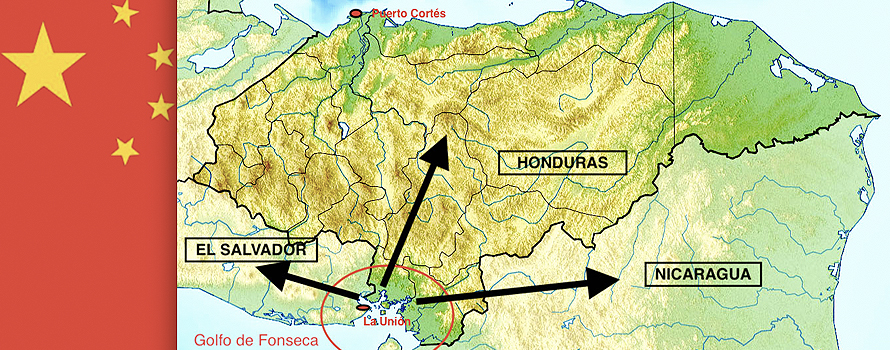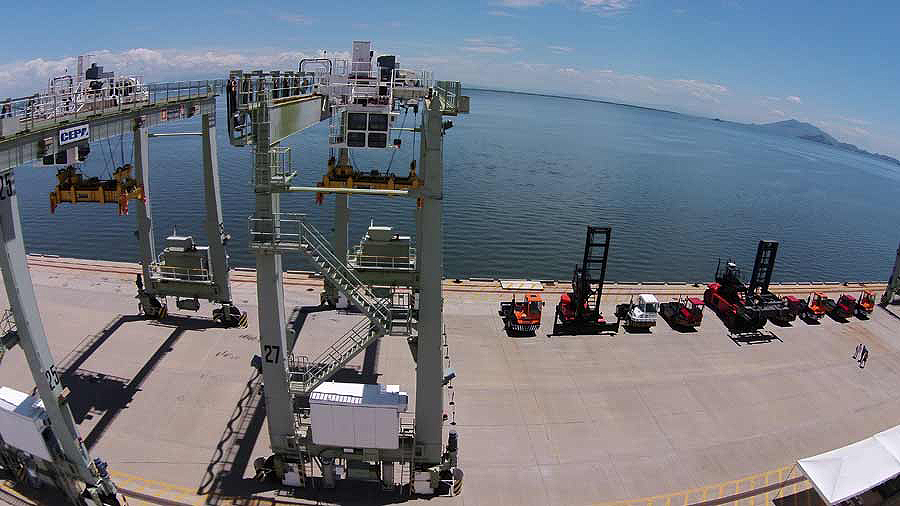After breaking off relations with Taipei, the Salvadoran government could give Beijing the management of a strategic port in the region.
Until a few years ago, China had no interest in Central America, basically because of the lack of raw materials. The diplomatic relationship that the region, almost as a bloc, maintained with Taiwan also diverted its attention. But the dynamic has changed. Encouraged by Chinese promises, El Salvador joined in August other neighboring countries that have been closing their embassies in Taipei. Why is China now interested in Central America? The Salvadoran case points to a desire to gain weight in an area of historic U.S. influence.

article / Jimena Villacorta
"After this careful analysis, advertisement that my government has made the decision to break the so-called diplomatic relations maintained until this day between the Republic of El Salvador and Taiwan and establish diplomatic relations between the Republic of El Salvador and the People's Republic of China". This is how Salvadoran President Salvador Sánchez Cerén announced the establishment of diplomatic ties with Beijing on August 20. The decision followed that adopted in May by the Dominican Republic and in 2017 by Panama, breaking the support of Central American countries to Taiwan.
Taiwan responded to this advertisement by assuring that the government of El Salvador had demanded an "astronomical sum" of money to finance the Salvadoran port of La Union and the campaign for the 2019 presidential elections of the government party, the Farabundo Marti National Liberation Front (FMLN), extremes that the Salvadoran government denied. The Taiwanese Minister of Foreign Affairs, Joseph Wu, presented the rupture of relations as a decision of Taipei, for the refusal to yield to those pressures, although everything indicates that the initiative was Salvadoran.
The internship of hidden payments is, of course, nothing new in the links between Taiwan and Central America, as it has been demonstrated the submission of checks to leaders of El Salvador and other countries to maintain diplomatic recognition so convenient for the Asian island. It is, in any case, a margin of corruption that, sometimes in the form of commissions, has also accompanied the landing of China in various countries.
The step taken by the Salvadoran government was criticized by the civil service examination. The mayor of San Salvador, Ernesto Muyshondt, of the Nationalist Republican Alliance (ARENA), described the decision as "terrible" and regretted that the leaders of the FMLN not only support "the repressive and murderous dictatorships of Cuba, Venezuela and Nicaragua", but also that "now they are breaking with a democratic country to establish relations with another dictatorship".
The civil service examination criticized that the Government is moved by partisan interests and leaves in the air the treaties and agreements signed with Taiwan, which has been a strategic partner for the country for 85 years and one of its main cooperators in areas of technology, health, agriculture and Education. Thus, there has been the loss of cooperation projects, financial resources and other aid, such as the scholarship plan for Salvadoran students in Taiwan.
U.S. Alert
The change of partner will foreseeably mean the substitution of Taiwanese programs for Chinese investment projects. In recent years, El Salvador has imported much more from China ($804 million in 2016) than from Taiwan ($135 million), but has exported similarly to both countries (about $50 million to each). It is normal that Taiwan will now stop favoring the purchase of Salvadoran products, which it used to prioritize, and that China will compensate the new relationship with investment in infrastructure.
This is where the possibility that China may take over the concession of the port of La Unión Centroamericana, in the southeastern end of El Salvador, in the Gulf of Fonseca, comes in. The Government has recognized the Chinese interest in this area, while the civil service examination criticizes the lack of information in the negotiations. The U.S. Embassy has even raised suspicions about the risk that, given the lack of transparency in the negotiations, China could use the facilities as a military base. Ambassador Jean Manes stated that "China's strategy of expansion in the region, not only economically but also militarily, is alarming". In fact, Washington has been warning for some time about China's increased presence in Central America, as in the case of the Panama Canal, in principle with civilian projects but which in certain circumstances could call into question U.S. security.
The U.S. Embassy has also indicated Chinese interest in buying Perico Island, located next to the port of La Unión. Last October, Ezequiel Milla, mayor of La Unión, stated that he had met with Bo Yang, a Chinese businessman and vice-president of the Chamber of Commerce between China and El Salvador, to discuss the sale of the island to build hotels. For his part, the businessman admitted having discussed purchase intentions with the owners of the private part of the island, where several families reside, who must be willing to vacate their homes. The island contains an important reservation of flora and fauna.
Unexploited port
The port of La Union is strategically located on the Gulf of Fonseca, where El Salvador, Nicaragua and Honduras converge (it is the only access of this country to the Pacific). In addition, it can connect in a matter of a few kilometers to the dry canal that Honduras is about to complete by widening the road linking its facilities in Puerto Cortés, on the Atlantic, with the Gulf of Fonseca. Honduras' coastline in the Gulf does not meet the appropriate conditions for a deep-water port, so the natural outlet for its goods to the Pacific would be La Unión.
The port construction project began in 1994, under the presidency of Armando Calderón Sol, with the goal of becoming the future "hub of the Americas", so that ships larger than the Panama Canal could dock there. Thanks to a loan from the Japan Bank for International Cooperation (JBIC), the project was launched. The port was built between 2005 and 2008 and inaugurated in 2010.
Under the presidency of Antonio Saca, there were two decrees for its concession. The first one, in 2008, was a master concession formula, that is, there would be only one operator managing the port for 25 years; however, an agreement could not be reached in the Legislative Assembly. In 2009, the second decree was presented, which proposed a company composed of the state-owned Autonomous Port Executive Commission (CEPA) and an international operator, with a 10% and 90% shareholding, respectively. But due to the change of government and other internal complications it was not approved either.
In June 2010, with Mauricio Funes as president, the port of La Unión was inaugurated under state administration, with the hope of being able to agree on a concession that same year. Finally, it was decided to apply the master concession. In September, the Assembly approved Decree 834, which contains the port concession law. Given the lack of approval of the bidding instructions and the contract by other institutions, the port concession was postponed for a couple of years, during which time the interested companies dropped out of the talks.
The bidding process was finally launched in 2014, but the tender was declared void in 2015 because there were no bids to operate in the infrastructure. In 2017, some laws were modified to attract investors, given the urgency of operating the port, whose maintenance has cost the country almost US$20 million in the last decade.
|

Port of La Unión, in the Gulf of Fonseca, in the Central American Pacific [CEPA].
|
Special Economic Zone
If to date the facilities have attracted so little interest from investors, what benefit could China see in La Unión? ARENA congressman Mauricio Vargas does not believe that Beijing has any economic interest in the port, but rather is pursuing strategic objectives, as the Gulf of Fonseca provides access to three Central American countries and is part of the area that the United States considers important for its own security.
To make the La Unión option more attractive, in July 2018 the FMLN government presented the Special Economic Zone Law for the South Eastern Region of El Salvador, an area corresponding to La Unión and a score of neighboring municipalities. Thanks to tax advantages, China could turn that Pacific point into a distribution center for its products in the Central American Northern Triangle and Nicaragua. The connection through the Honduran dry canal would facilitate connection with the Atlantic.
The civil service examination believes that the creation of this special economic zone, which in the event of a massive influx of Chinese products could negatively affect local manufacturing, has been agreed in advance with China. The ECA president, however, denies obscurantism in the process. "We have nothing to hide. The process we are carrying out is transparent; we have entered an enquiry stage. The interest of our administration is to operate the port of La Unión and we must see it as a project for the country". He assured that there are companies interested in the concession also from Europe and America, not only from Asia.